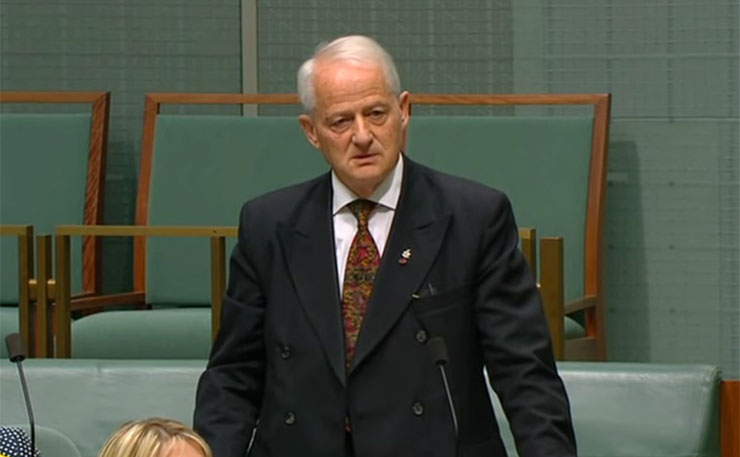Philip Ruddock has announced he will leave parliament at the end of this term. Good riddance to bad rubbish, says Chris Graham.
Babies are in the news. We’re sending 37 of them back to Nauru. Because, you know. They’re babies!
Philip Ruddock is also in the news. He’s announced today he will be retiring from a profession that once kissed babies, and now jails them.
We’ll return to the Babies/Ruddock angle later, because first it’s important to acknowledge the longevity – not to mention the achievements – of a man whose done more to disgrace this nation than most politicians before him.
Philip Maxwell Ruddock is also known as the ‘Father of The House’. He’s served longer than any of his contemporaries, clocking up 42 years in September last year.
I’ve always found the term ‘Father’ in relation to Ruddock a bit of a misnomer. My dad, from memory, never tortured babies and blackfellas. Different strokes for different folks, I suppose.
Ruddock first came to national prominence when he crossed the floor of parliament against the wishes of Opposition leader John Howard, who was trying to curtail Asian immigration.
Howard had told the John Laws radio program a few days earlier, “I do believe that if it is – in the eyes of some in the community – that it’s too great, it would be in our immediate-term interest and supporting of social cohesion if it were slowed down a little, so the capacity of the community to absorb it was greater.”
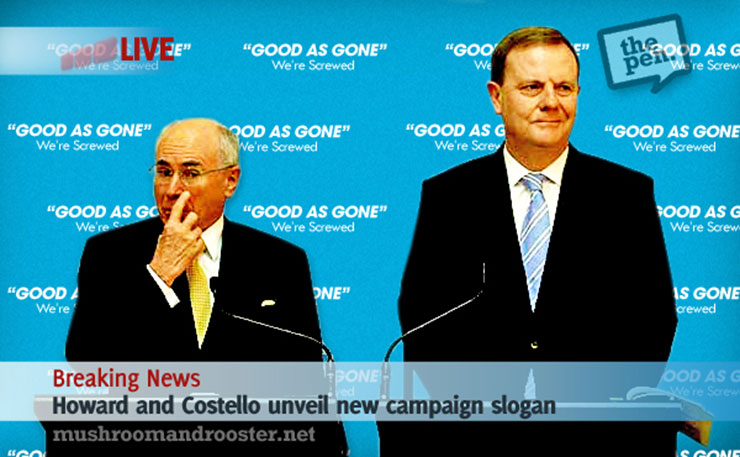
And here’s Ian Sinclair, the ‘Father of the Parliament’ immediately before Ruddock: “If there is any risk of an undue build-up of Asians against others in the community, then you need to control it. I certainly believe that at the moment we need […] to reduce the number of Asians.”
That was back in 1988, ironically the year we celebrated 200-years of Australian racism. After 16 years in parliament though, Ruddock obviously had managed to maintain some semblance of an ethical base.
All that would change soon enough.
It’s rumoured Howard long held a grudge against Ruddock, but by 1996, in large part to placate the left of his party, Howard appointed Ruddock Minister for Indigenous Affairs and Minister for Immigration.
Both portfolios were at the bottom of the rung in terms of prestige and hierarchy, indeed neither were even included in Howard’s first cabinet.
By 1998, however, Howard was beginning to sense some opportunities around immigration. He moved the portfolio into his second cabinet.
By March 2000, Amnesty International formally requested that Ruddock, a member of the international justice group, no longer wear his Amnesty pin while performing ministerial duties, given his government’s policies around mandatory detention (introduced by Labor).
Ruddock, of course, refused to take it off, and still to this day dons it when he can, if not to display his human rights credentials, at least to underscore the impressive size of his fragile ministerial ego.
As Ruddock’s infamy grew, so did those revolted by him.
Then came the Tampa election, and a Liberal star was born. Ruddock, widely distrusted by his more conservative colleagues, suddenly found his way into the inner sanctum.
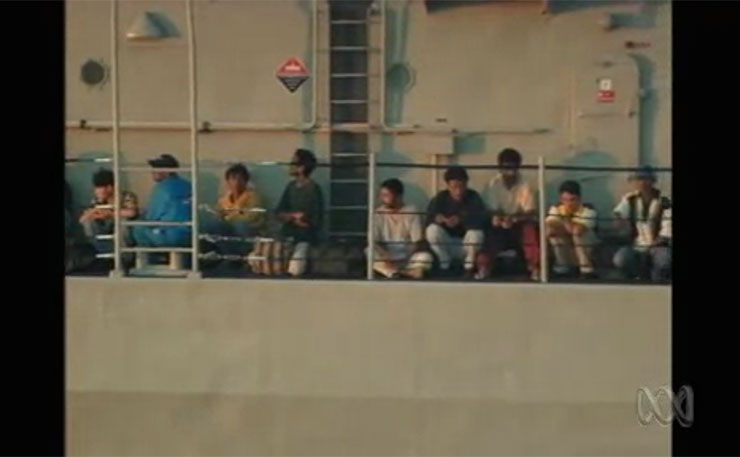
So reviled was the Minister for Immigration that he was assigned his own personal security detail – an unusual development for the time, as security details had been mainly restricted to Prime Ministers.
This was around the time that Ruddock’s daughter, Kirstie – a human rights lawyer – reportedly left Australia because she was so appalled at the actions of her father.
Soon after that, Ruddock played a starring role in the Children Overboard affair when he bare-facedly lied to the Australian public by claiming that asylum seekers threw their children into the sea. He went on to deport Australian citizens Cornelia Rau and Vivian Solon, believing them to be illegal immigrants.
As Aboriginal affairs minister, Ruddock was comparatively quite benign, although a leaked cabinet minute in 2004 revealed he was also seen that way by his colleagues, all of whom ignored a memo requesting they report on progress in their own portfolios around Aboriginal advancement.
Ruddock went on to serve a stint as Attorney General – critics have claimed this was the job Ruddock had always coveted, and the chife reason why he’d been prepared to jettison any sense of morals over immigration. It was a fairly unremarkable tenure as the nation’s top law officer… save, of course, for his central role in the Haneef affair, for which he’s never apologised (like I said… ministerial ego).
You might also want to google ‘Philip Ruddock’ and ‘David Hicks’, and then throw in ‘Ruddock and Mamdouh Habib‘ while you’re at it… if a minister’s career is measured in the number of scandals in which he manages to embroil himself, Ruddock is almost without peer.
When Howard lost office in 2007, Ruddock, mercifully, faded into relative obscurity, and many believed he would simply retire.
But he didn’t. Instead, Ruddock emerged as the curmudgeonly old rascal, skulking the halls of parliament searching for relevance. That’s possibly what led Buzzfeed to publish the puff piece of the year in 2015 – “I Showed Australia’s Oldest Politician Snapchat And It Was Ridiculously Adorable” – which sought to cast the man who popularized the torture and political abuse of asylum seekers as the ‘silly old fella’ who vomited rainbow colours while learning to use Snapchat.
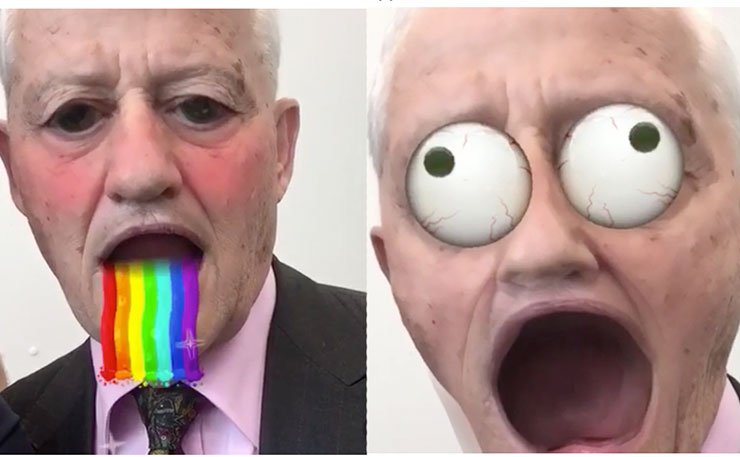
Personally, as an Aboriginal affairs reporter during Ruddock’s term, I have quite different memories of the man. Indeed, I have two particularly satisfying memories of Ruddock, and both happened when his two portfolios of Aboriginal Affairs and Immigration came crashing together, with unsettling results.
In the mid-2000s, I was in Port Augusta in South Australia, covering the annual Croc Festival, a kind of travelling ‘rock eisteddfod’ for regional and remote Aboriginal communities.
Port Augusta also happened, at the time, to be home to the Baxter Detention Centre. In those days, our asylum seeker policies were slightly less cruel – yes, we locked up men, women and children without charge, but we also let the kids out during the day to attend local schools… before locking them back behind razor wire at night.
And so it was that Philip Ruddock – Minister for Indigenous Affairs – came to tour the Croc Festival in a town where he was almost certain to come face-to-face with the people who, as Minister for Immigration, he was mandatorily detaining for the foul crime of seeking asylum.
On the morning of day two of the event, Ruddock decided to tour the exhibitions and stalls attached to the Festival. My job was shadow him and his minders, all of whom I knew reasonably well.
The organisers of ‘the Croc’ had asked me if I’d like to take along ‘an apprentice’ for the day – a young Iranian boy named Ali, who was being held at Baxter. Naturally, I said, ‘F**k yes’.
And so we wandered off to find Philip Ruddock. I didn’t have to explain to Ali who Ruddock was – he already knew more than enough about the man who locked him away at night.
As I approached Ruddock, he was effusive in the way that slimy ministers always are, extending his hand and smiling his rictus grin… only to notice, mid-shake, that a strange boy of ‘Middle Eastern appearance’ was standing beside me, also grinning and filming everything with a small handi-cam.
“Who’s this?” an anxious Ruddock asked.
“Oh, this is my apprentice for the day, Ali. He’s from Iran.”
I suggested Ali might like to ask the Minister some questions… and that’s when things got really awkward.
As all good journos should, Ali started soft: ‘What’s it like being the Minister for Immigration?’ Ruddock replied that it was “good”.
Pleasantries out of the way, Ali then asked: “Why do you lock up asylum seekers?”
Interview over, with the minister’s adviser staring daggers at me as we were shooed away by Ruddock’s goons.
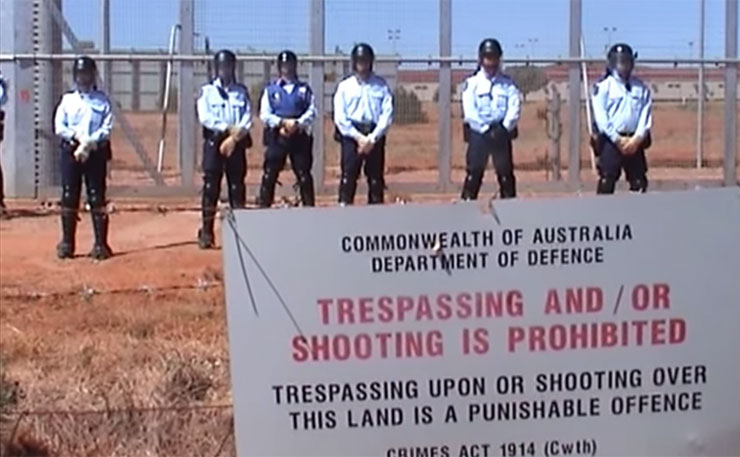
Later that evening, Ruddock turned up for the performances. He and his minders, as you might imagine, had special seating roped off for VIPs.
As it turned out, that’s also where they sat the asylum seeker parents, who were allowed out to watch their kids perform on stage. I loved the irony – it was probably the only time in their lives Australia had ever rolled out the red carpet for them, and only then to ensure they didn’t disappear into the crowd.
As Ruddock sat down, an asylum seeker approached him, holding her baby. In one deft move, she handed the baby to a perplexed looking Ruddock. As she did, she asked, “This is my child. Why are you locking us up? We are not criminals.”
Whatever colour the ‘Grey Ghost’ (his nickname in Aboriginal affairs) had in his face drained away.
Needless to say, after Ruddock handed the baby back – a scene that reminded me of how someone with Coprophobia (a fear of faeces) might return a baby with a soiled nappy – mum and bub were whisked away by one of Ruddock’s goons to the far corner of the roped off section.
I happened, ironically, to be sitting one row back with a man named John Howard – Dr John Howard, to be precise, a psychiatrist with the Tedd Noffs Foundation.
John remarked in a loud, sarcastic voice, “Oh dear, I hope the Minister’s okay. That must’ve been awful for him!”
I laughed even louder.
Ruddock didn’t turn around to look – he just stared straight ahead.
Of course, if I’d known then what I know now – what Ruddock and his cronies would go on to do to other asylum seeker babies – I never would have laughed. I’d have probably chanced my arm against his goons.
Sadly, Philip Ruddock’s not disappearing entirely from the political scene. He will, reportedly, head Australia’s push to be included on the United Nations Human Rights Council.
And why not, I ask. We’re already international human rights pariahs. Why not send one of the biggest to help re-inforce that?
At least his new job won’t bring him into contact with children anymore.
Donate To New Matilda
New Matilda is a small, independent media outlet. We survive through reader contributions, and never losing a lawsuit. If you got something from this article, giving something back helps us to continue speaking truth to power. Every little bit counts.

